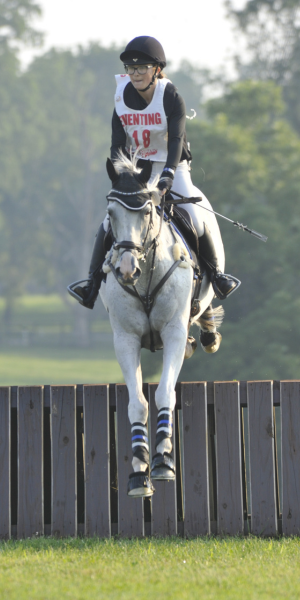
The C-3 candidate should maintain a basic balanced position with a secure base of support. Rider should demonstrate the development of an independent seat and coordinated use of aids on the flat, over fences, and in the open. The candidate should initiate and maintain free forward movement with smooth transitions and a steady, light feel of the mount’s mouth. The candidate should discuss and evaluate the aids used. The candidate should show confidence and control at all gaits on the flat, over fences, and in the open. Candidate should be familiar with the training scale.
The B candidate should demonstrate an independent seat and effective tactful use of aids on the flat and over fences. Candidates should demonstrate the elements of the training scale to include riding the horse in balance with rhythm, relaxation, and connection while developing impulsion and straightness; be confident in coping with disobedience; be able to explain the application and reasons for aids and to discuss the basic principles of dressage. Be prepared to discuss the training scale as related to the B Standard.
The A candidate should maintain a basic balanced position appropriate for dressage, jumping, and cross-country riding, based upon the development of an independent seat and coordinated use of aids. Candidates must be able to competently ride different mounts (schooled, green, or spoiled) at various stages of training displaying confident, consistent, and effective performances. They should assess and demonstrate schooling techniques beneficial to each mount, and ride with tact and empathy for his/her capabilities, utilizing the training scale and its importance to each phase of Eventing. After each performance, the candidate will evaluate the mount’s stage of schooling (strengths and weaknesses) and discuss whether they have been effective in achieving their goals.
USEF Dressage tests used in the Eventing certifications are available through United States Eventing Association (USEA).
The Training Scale has evolved as a means to illustrate the different steps that are essential elements in the correct training of the horse. It is important to understand that these elements are interrelated. One step is not supposed to be perfect before attempting the next, but instead, they should be used as a reference for understanding the general progression and development of the horse in his training from young horse to final goals. (USPC Manual of Horsemanship: Advanced Horsemanship)

Barn Mice
This links to the blog section of the Barn Mice site. Be sure to scroll down to William Micklem's blog which is always very insightful as are Jane Savoie's. Although Jane's are mostly on dressage she often delves into sports psychology.
Equifitt.com
This informative site features hundreds of articles on the subject of fitness of both mind and body for the equestrian athlete.
Eventing Safety: The Question of Rider Fitness
From thehorse.com, your guide to equine health care. This excellent article discusses the importance of rider fitness and safe cross-country riding.
USEF Guidelines for Drugs & Medications Library
The USEF strongly encourages its members to review the current Drugs and Medications Rule and to be aware of the published recommendations for treating a horse in competition. These recommendations can be found in the Federation’s Drugs and Medications Guidelines pamphlet and are provided as a link on this website.
Horse & Country
Based in the United Kingdom, Horse & Country features videos from some of the greatest competitions across the pond, clinics with Lucinda Green, & an interview with eventing greats Clayton & Lucinda Fredericks, plus much more!
Discover Eventing
Discover Eventing is devoted to educating and informing readers about the sport of three-day eventing.
Eventing Nation
Eventing Nation is a site of everything eventing all over the world: results, blogs, reports on training sessions with Mark Phillips and all sorts of video clips, many of which that have nothing to do with eventing, but just plain fun.